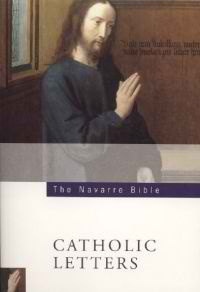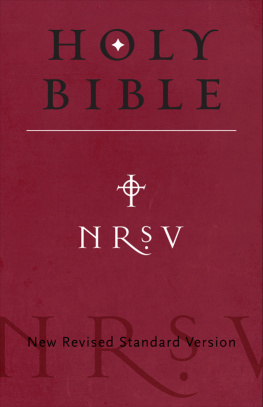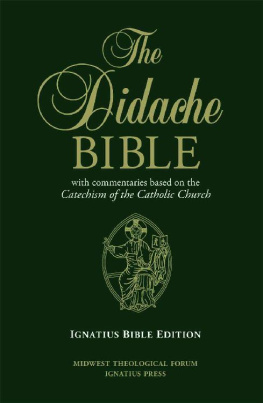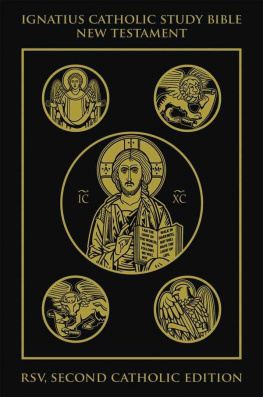Preface
In providing bothundergraduate and postgraduate education, and in the research it carries out, auniversity is ultimately an institution at the service of society. It was with thisservice in mind that the theology faculty of the University of Navarre embarkedon the project of preparing a translation and commentary of the Bibleaccessible to a wide readershipa project entrusted to it by the apostolic zealof the University's founder and first chancellor, Monsignor Josemara Escrivde Balaguer.
Monsignor Escriv didnot live to see the publication of the first volume, the Gospel according to StMatthew; but he must, from heaven, continue to bless and promote our work, forthe volumes, the first of which appeared in 1976, have been well received andwidely read.
This edition of theBible avoids many scholarly questions, discussion of which would over-extendthe text and would be of no assistance to the immense majority of readers;these questions are avoided, but they have been taken into account.
The Spanish editioncontains a new Spanish translation made from the original texts, always takingnote of the Church's official Latin text, which is now that of the New Vulgate,a revision of the venerable Latin Vulgate of St Jerome: on 25 April 1979 PopeJohn Paul II, by the Apostolic Constitution Scripturarumthesaurus, promulgated the editio typicaprior of the New Vulgate as the new official text; the editio typica altera, issued in 1986, is the Latinversion used in this edition. For the English edition of this book we considerourselves fortunate in having the Revised Standard Version as the translationof Scripture and wish to record our appreciation for permission to use that text,an integral part of which are the RSV notes, which are indicated by superiorletters.
The introductions andnotes have been prepared on the basis of the same criteria. In the notes (whichare the most characteristic feature of this Bible, at least in its Englishversion), along with scriptural and ascetical explanations we have sought tooffer a general exposition of Christian doctrinenot of course a systematicexposition, for we follow the thread of the scriptural text. We have also triedto explain and connect certain biblical passages by reference to others,conscious that Sacred Scripture is ultimately one single entity; but, to avoidtiring the reader, most of the cross-references are given in the form ofmarginal notes (the marginal notes in this edition are, then, those of theNavarre Bible, not the RSV). The commentaries contained in the notes are theresult of looking up thousands of sources (sometimes reflected in explicitreferences given in our text)documents of the Magisterium, exegesis by Fathersand Doctors of the Church, works by important spiritual writers (usuallysaints, of every period) and writings of the founder of our University. Itwould have been impertinent of us to comment on the Holy Bible using our ownexpertise alone. Besides, a basic principle of exegesis is that Scriptureshould be interpreted in the context of Sacred Tradition and under the guidanceof the Magisterium.
From the very beginningof our work our system has been to entrust each volume to a committee whichthen works as a team. However, the general editor of this edition takesultimate responsibility for what it contains.
It is our pleasant dutyto express our gratitude to the present chancellor of the University of Navarre ,Bishop Alvaro del Portillo y Diez de Sollano, for his continued support andencouragement, and for reminding us of the good our work can do for the Churchand for souls.
"Since SacredScripture must be read and interpreted with its divine authorship inmind," we pray to the Holy Spirit to help us in our work and to help ourreaders derive spiritual benefit from it. We also pray Mary, our Mother, Seatof Wisdom, and St Joseph, our Father and Lord, to intercede that this sowing ofthe Word of God may produce holiness of life in the souls of many Christians.
Rulesfor Biblical Interpretation
THE SPECIAL NATURE OF SACRED SCRIPTURE
The books of the Biblehave certain unique features. They are a collection of writings which our faithtells us are not simply man-made: they are the Word of God. They are sacredbooks because, "written under the inspiration of the Holy Spirit, theyhave God as their author, and have been handed on as such to the Churchherself." They were written by individuals in the distant past, whosenames very often we do not know; our faith teaches us that God "acted inand through" these writers ("hagiographers") in such a way that"it was as true authors that they consigned to writing whatever he wantedwritten, and no more."
The content of the Bibleas it has come down to the Church from the Jewish people and the Apostles isboth divine and human and can be compared in a way to the mystery of JesusChrist, who is true God and true man. "The words of God, expressed in thewords of men, are like human language, just as the Word of the eternal Father,when he took on himself the flesh of human weakness, became like men." Inorder to grasp who Jesus is, we need first to look at Jesus as man; from thiswe are drawn to ask who the Person of Christ is and we discover that he is theSon of God become man. In a parallel way, to obtain a profound understanding ofSacred Scripture we need to go beyond its "human" dimensions(historical, literary, etc.) and, helped by those very dimensions, to discoverwhat God wants to reveal to us in the Bible.
Therefore, to interpretScripture correctly, one needs to approach it with the help of appropriatetools or principles. These principles must be imbued with, and guided by faithin, the human and divine character of these books, in the same way as aspectsof Jesus' life (for example, the way he speaks, the way he relates to others)are only fully appreciated in the light of faith in his being the Son of Godmade man.
That is not to say thata person without faith cannot obtain true knowledge of Jesus or cannot throwlight on literary, linguistic or historical aspects of Holy Scripture. What itdoes mean is that unless one's outlook is guided by faith one cannot fiteverything together to discover the full truth about the Saviour or thetotality of his message: it is not enough just to know biblical languages orunderstand the structure of the texts. For the various principles of correctbiblical interpretation to work properly, they need to be imbued with faith inScripture as being divinely inspired. The study of these principles, thescience of biblical heuristics, is a sub-division of hermeneutics.
TWO KINDS OF PRINCIPLES FOR BIBLICAL INTERPRETATION
In a section dealingwith interpretation of Scripture, the Second Vatican Council teaches thatbecause "in Sacred Scripture, God speaks through men in a human fashion,it follows that the interpreter of Sacred Scripture, if he is to ascertain whatGod has wished to communicate to us, should carefully search out the meaningwhich the sacred writers had in mind, that meaning which God had thought wellto manifest through the medium of their words."
The aim, therefore, ofbiblical interpretation is not achieved merely by determining what the human authorsintended to transcribe and how they did so; it also involves discovering whatGod is revealing to us through those words. These two aspects, the divine andthe human, cannot be separated; and yet they are distinct.
When someone writessomething, there is always a certain difference between what he meant to say byexpressing himself as he did and what the reader actually takes the text tomean. A written text does not always manage to express exactly what its authormeant (because language has its limitations) and certainly it is impossible forthe author to know what meaning the reader may take from it.
Moreover, a text that isread long after it was written and after many interpretations have been made ofit may say more than the author intended. For example, a modem reader ofShakespeare might obtain insights into human nature which Shakespeare himselfwas not conscious of conveying; but any interpretation would be invalid if it failed to take account of what Shakespeare intended tosay, that is, if it distorted his original meaning. As St Jerome points out,"it is the function of the commentator not to say what he pleases but toexpound the meaning intended by the author he is interpreting."












